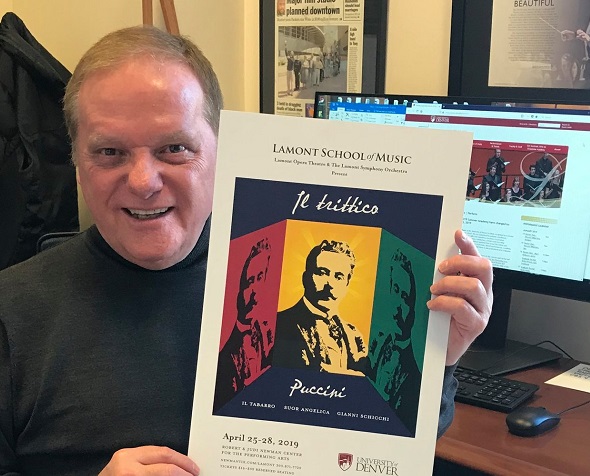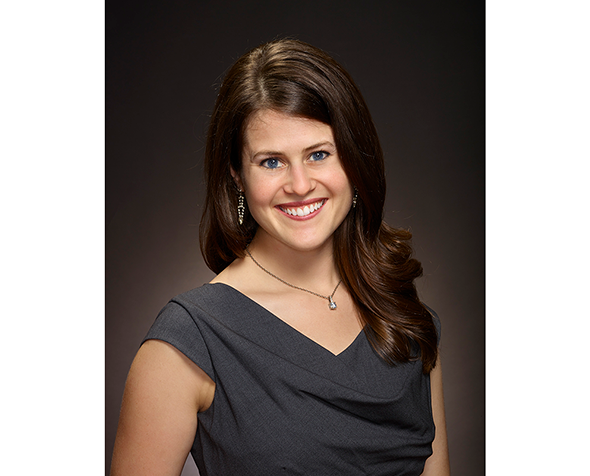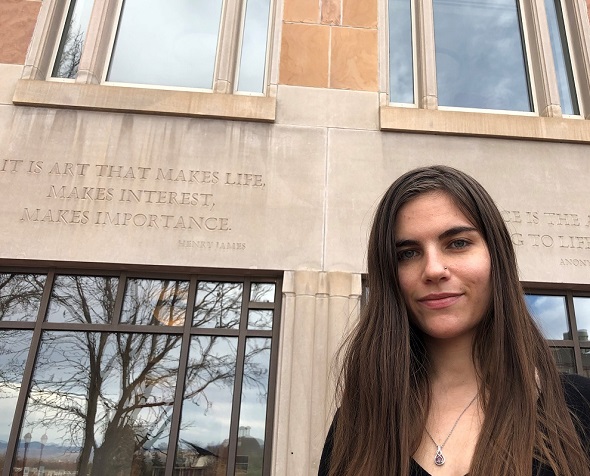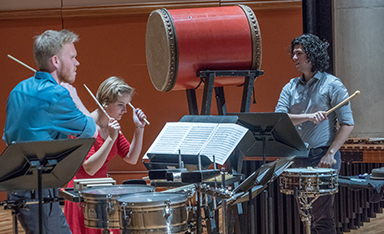Lamont Staff Profile: Stephen Campbell

Deciding where to go to college can be a daunting task for even the most prepared high school senior and their parents. For those who are considering a music major, it can be especially complicated when managing the various audition requirements and deadlines.
At the Lamont School of Music, these students and parents are helped by the expert guidance of Director of Admission Stephen Campbell. For the past eight years, he has led Lamont’s admission office, which includes guiding prospective undergrads and grad students, as well as navigating the complicated and shifting landscape of financial aid.
Like nearly everyone in music admission work, Campbell is a trained musician, focusing on voice and trumpet. He is a native of Phoenix, Arizona and attended CU-Boulder for his undergrad, then the Peabody Institute for his master’s. As graduation approached, he faced the familiar choice of what to do for work, and recounts how he landed in admission work.
“After grad school, I decided I didn’t want to live out of a suitcase and travel around for gigs, which is necessary for almost all performing musicians,” he said. “I was also married by this point, so that impacted my decision to look for a full-time job.”
Serendipitously, an admission job was posted at Peabody, and Campbell knew he had to go for it. Though he didn’t quite have the several years’ experience that the job preferred, his persistence paid off.
“I showed up at their office every couple of days to remind them that I wanted the job,” he remembers. “Finally, one of the bosses called me in to explain why I thought I should be considered. They granted me an interview, and I ultimately got the job.”
At Peabody, Campbell found that he loved working with student musicians, shepherding them through the same process that he went through. The position also allowed him to keep performing with local opera companies and churches.
In 2014, he got a call from his predecessor at Lamont, Colby Carson, that the admission director position was going to be open soon, and that he should consider applying. He got the job, and started two weeks later in January 2015. Since then, he has assisted thousands of music applicants and also watched how college admissions have evolved over the years.
“People are applying to more colleges individually, so yield rates have gone down,” he said, referring to the percentage of admitted students who go on to enroll at a school. “It’s more and more competitive for us to get students. Costs have also risen astronomically, so there are so many more conversations with students and parents about return on investment for a music degree.”
The music industry itself has also changed, so students are coming in with different ideas of what a music career will be, and sometimes this conflicts with the experiences of the faculty. “But there is this unifying factor among prospective music majors: the love and passion for music,” Campbell said. “That has definitely not changed!”
Campbell has spent the past several years working on his doctorate from the Morgridge College of Education, utilizing DU’s tuition waiver. He is now officially Dr. Campbell, having graduated with his Ed.D. in Higher Education in August. His qualitative research focused on how counselors and teachers at the high school level guide prospective music majors through college selection, with a particular focus on how these counselors view the value of a music degree and how that impacts the students.
“What I found with the folks I interviewed was that they really value a music degree, but they don’t know how to pay for it or if there are jobs out there,” he said. “So these counselors are encouraging students on one hand, but discouraging them on the other. It really confirmed for me that people oversimplify the path after college. It’s not a vending machine where you put in money and then get the specific job you want.”
Campbell remains a firm believer in the value of going to college, despite the rising costs and less certain future. “There is so much value in learning in community with others, and also in having a network there as you graduate and start looking for jobs,” he said. “The support of places like DU and Lamont is really worth it, having those people to help you along the way.”





